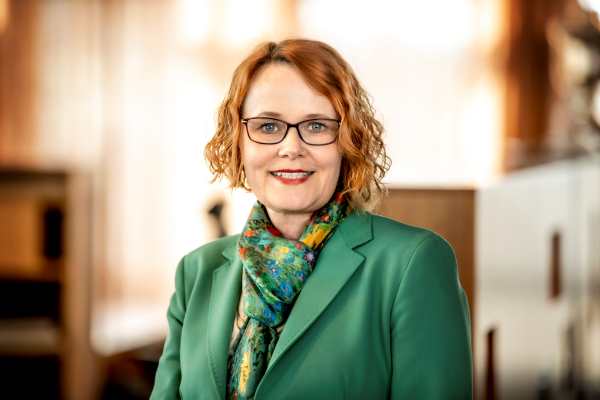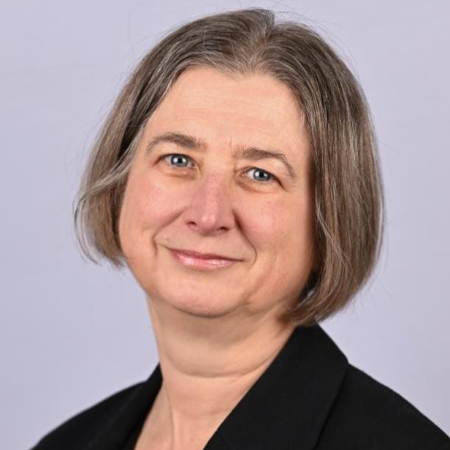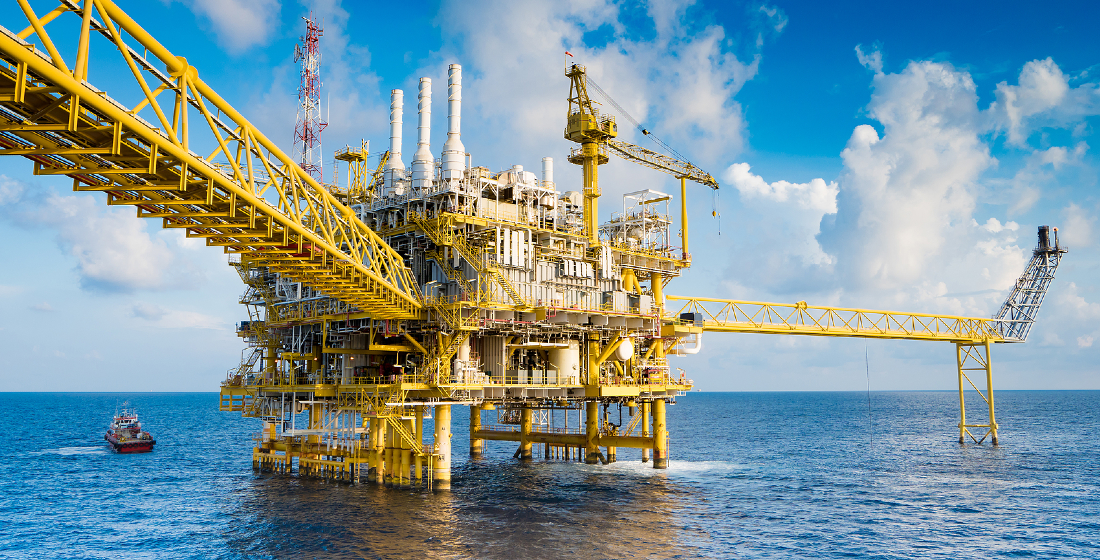Keynote: EKN’s Jatko on the wisdom of cooperation
As EKN passes its 90th anniversary milestone, celebrating its ‘wise old lady’ status, CEO Anna-Karin Jatko reflects on risks and the need for more cooperation in an interesting competitive environment.

TXF: How would you characterise business in EKN’s 90th year of existence?

Anna-Karin Jatko (AKJ): We’ve had a record year so far, providing SEK76 trillion [$7 trillion] in cover to support exporters to 140 countries to the end of August. It's an interesting combination because we're seeing more risks interacting than ever before in terms of economic, geopolitical and climate risks. It’s a question of where and how they all feed into each other, and there are both short and long term risks.
Many countries, not least in Africa, are facing financial challenges that we're all aware of, but in terms of the general risk environment I have never seen such a challenging, but also interesting, combination. There are definitely opportunities, but we may need not only to build on our 90-year record and experience, but also look ahead in trying to predict the more uncertain future. That does require more cooperation.
Apart from the risk environment and the need for more cooperation, we have an interesting competitive environment which is not only linked to the geopolitical situation. There’s a need for EU countries to be working more in cooperation than ever. And we're seeing several large projects where we are now working with ECAs that are new to us when it comes to co-financing. We need to strengthen our partnerships, but also to build new ones. ECA cooperation is key to success.
TXF: Before the pandemic you were getting more small deals coming through, then a large amount during the pandemic, are the deals now relating more to cyclical and inflationary pressures for corporates?
AKJ: From our conversations with banks we’re seeing very substantial demand and are getting more queries than ever before. However, a lot of them are also more complicated than ever – risky markets, sometimes new structures.
Exports are still happening. And the fact that there is such a demand for export finance is something that's both obviously great in terms of building our volumes, but also we are challenging ourselves because it's somewhat uncharted territories.
There is definitely more demand than supply for financing and that comes from many parts of the world. It’s not only large projects, it's supplier finance and also short term finance. There are more letters of credit (LCs), for example which may be more challenging to the banks than they were before.
TXF: A lot of conversations we have had are about the relative decline of short term trade documentary credits, but you're seeing more LCs issued by banks being backed by ECAs?
AKJ: There is also more requirements by banks to have their LCs covered. It’s a riskier environment and banks and our clients need more risk coverage.
TXF: Is that the result of banks’ derisking their correspondent banking since the global financial crisis?
AKJ: That derisking strategy is hitting its stride. It is a structural strategic issue. Banks are less interested in providing short term coverage. One of the largest Swedish banks has withdrawn from 50 markets, for example, and banks are getting more cautious when it comes to what used to be their ‘bread and butter’.
TXF: Is providing supplier credits for larger contracts still a major trend?
AKJ: We still see that. Another trend we see very clearly is a rise in demand for counter-guarantees, which are important when it comes to large infrastructure projects. That's a mirror of the derisking strategy of the banks and the companies themselves. Counter-guarantees used to be mostly for small and medium sized companies, but there has been an uplift in larger companies using them.
We provide a wide range of guarantee products. My impression is also that we cover exports to a higher number of countries than many of our, larger, ECA peers. We have a wide range of exports because Swedish business sectors are diverse.
TXF: You place a lot of emphasis on EKN’s ability to support SMEs, particularly in the green sectors – how important is working capital support in terms of your portfolio?
AKJ: Very important. SME exports make up nearly 40% of Sweden’s exports, more if you include sub-suppliers to large companies, and about half of the number of transactions of EKN’s export support is to SMEs. Swedish SMEs operate in a broad range of fields from apps and games to energy efficiency, plant-based alternatives to dairy products, transport logistics, organic farming, and niche industrial solutions – many inspired by global demand for sustainable alternatives.
TXF: We’ve had some OECD Consensus reform since we last spoke. What’s been the impact on what you can cover? Has it gone far enough, too far, or is it the ‘Goldilocks’ solution?
AKJ: It’s early days but the reform is an important stepping stone. In terms of ensuring European competitiveness we need to be exploring the needs of the market now that we have more flexibility. We have already started using the new terms and conditions and there are opportunities.
The challenge of the reform is that although we now have the ability to cover longer tenors, that requires the banks to provide financing on those longer tenors. In view of the current credit climate, are banks able to issue credits on those tenors we can now offer? After all, we’re now back to the old days where money now costs money and the game has changed.
The question is reform too soon, or too late? It’s great we have more tools, but we will have to follow market developments and demand to be able to use those tools. It’s interesting as we’ve already issued large offers under the new terms and conditions, so they are definitely usable.
Is there a need for more reforms? I'm sure there is. More than anything, there's a need to ensure that the OECD, in view of the geopolitical situation, moves more quickly when it comes to decision making on terms and conditions or on the Agreement. That's something that we all need to be working on as it took a long time to get the current reforms.
TXF: You now have ‘green’ versions of your ordinary guarantees, how is demand? Has there been any of the ‘green fatigue’ we’ve seen in some markets?
AKJ: No green fatigue at all from the point of view that Swedish companies really have sustainable solutions. Sustainability is now part of the DNA for many companies and we are very aligned with them. So far, we've seen rising demand [for green guarantees] as well, which from a sustainability point of view is reassuring that there is still interest in exporting innovative technical solutions that will be a benefit for all parties.
TXF: EKN has brought in a Raw Materials Guarantee to secure Sweden’s import of raw materials. How is this progressing?
AKJ: We are working on our first deal, which takes time, and we have had lots of cooperation with our German and Finnish colleagues on this, which has been very beneficial and which also will be beneficial for EU competitiveness.
TXF: Can you highlight any particular deals where ‘Team Sweden’ has worked particularly effectively?
AKJ: Team Sweden has worked successfully in sustainable transport, such as BRT in Côte d’Ivoire and electrified rail in Tanzania and renewable energy in Angola and water distribution in Côte d’Ivoire.
TXF: How is the focus on working with engineering, procurement and construction companies (EPCs) outside of Sweden, going?
AKJ: We don’t have a Swedish EPC. We are building up our relationships with EPCs both in Europe and outside – most recently in Latin America and in Asia. There is a strong demand for Swedish exporters as sub suppliers for large infrastructure projects in sustainable transport, renewable energy and social sectors in markets such as sub-Sahara Africa, Middle East and Southeast Asia. In our pipeline, for example, we have infrastructure projects in Angola and Tanzania, water distribution, sustainable transport and renewable energy, renewable energy in Saudi Arabia and sustainable transport in the Philippines.
TXF: You’ve signed multiple collaborations – most notably a co-financing agreement with US Exim in June – how important is collaboration and what trends are you seeing in terms of reinsurance and co-financing among ECAs?
AKJ: All the collaborations we're looking at are a win-win for all parties involved. Now more than ever we are discussing co-finance with other ECAs rather than just simple reinsurance on a bilateral basis. That's also one way of improving our competitiveness in Europe.
The old and easy type of cooperation was based on one party reinsuring the other and you cover your own exports. Now we're discussing transactions where there are several ECAs involved, where we are working jointly on the ESG questions and where there's more of a more of a co-financing approach than a reinsurance approach. Of course, reinsurance is at the basis, but we are pursuing discussions with several banks that want to ensure that it's more of a consortia of ECAs involved in financing rather than simple bilateral reinsurance.
TXF: And the banks are acting as MLAs on these deals?
AKJ: Yes. Our relationships and partnerships with banks are really crucial because they are the originators of many of these transactions. They work in collaboration with the buyer, then they are trying to ‘cherry pick’ ECAs and which ECAs have the right type of exporters to cover the need of the specific project. That’s a definite trend we're seeing a lot more of. We're going to get to know our ECA colleagues much more in depth than we've ever done before if we're going to successfully pursue some of these transactions.
TXF: So not only Swedish banks as partners then?
AKJ: Just as we don't have a Swedish EPC network we can build on, the Swedish and Nordic banks are not really involved in project financing, which means that we are very reliant on international banks because they are effectively financing the buyers of Swedish exports. On the one hand, you have the traditional type of export finance where you have large companies with projects for which they need export finance. On the other, you have the large banks that now choose which countries’ ECAs will be involved based on the ability, availability and the nature of the project. As Sweden has a lot of exporters that are active in the infrastructure sector, that means that we have a lot of different exporters that we can support.
TXF: Are you also involved with development finance as well as project finance?
AKJ: This is another change we're seeing, our government is now pursuing much closer links between export finance and aid. We have been providing finance for Ukraine, and development finance will be important there. The government also wants to ensure that we are much better at using these two instruments in a way that's both beneficial for the countries, and for Swedish exporters. It is important we find new ways of being able to support Ukraine. A combination of export finance and aid is the only way forward to ensure that we can meet the short term requirement, but also the long term one.
TXF: Historically this has been a challenging area, differentiating aid and trade and ensuring a level playing field.
AKJ: Our Danish and our Dutch colleagues are pursuing initiatives and our government is also actively considering this area. There will be a new strategy announced by the government soon and we may be working more along the lines of other European countries that are changing the way they use these different instruments, obviously within the framework of the OECD rules. The OECD determines rulemaking both for export finance and aid.
TXF: Which markets are exciting you going forward and what's worrying you?
AKJ: They are two sides of the same coin. What's exciting is the huge demand, that’s also the flip side. They are either quite risky markets or projects, and also relatively complicated structures. So the risk is the demand is increasing, which is always an opportunity, but so are the risks relating to that demand.
The fact that Swedish exporters are active in so many markets globally mean that we are working hard to match their abilities and ambitions.
That brings us back to the question of what risk appetites do banks really have. Where ECAs can cover up to 100% reminds us of our traditional core business, where we started off 90 years ago. We see both demand in sovereign risk, but also of course, demand for commercial risk. The unique element now is seeing huge demands for both. Not a bad place to be for EKN as a ‘wise old lady’.





